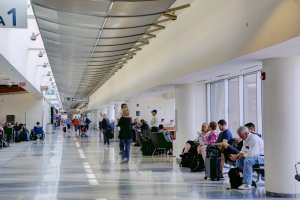
U.S. Senate Republican Leader Mitch McConnell (R-KY) announced today the U.S. Department of Transportation will provide $13,000,000 to Louisville Muhammad Ali International Airport (SDF) to support several infrastructure upgrades critical to airport operations.
SDF will receive $7,500,000 to expand security operations for passengers, adding four screening lanes to the existing security checkpoint. The airport will also receive $5,500,000 to upgrade its power supply systems, enabling continued airport operations during emergencies and power outages. Senator McConnell contacted the Secretary of Transportation in support of SDF’s competitive grant application for this project.
Both federal grants are funded through the U.S. Department of Transportation’s Airport Terminal Program, established in the bipartisan Infrastructure Investment and Jobs Act (IIJA). Senator McConnell led the IIJA to Senate passage in 2021, and the President signed the bill into law. The IIJA gives Kentucky billions of federal dollars over five years to improve the Commonwealth’s roads, bridges, railroads, riverports, airports, broadband, and more.
“With SDF celebrating several of its busiest years on record, it’s essential we continue to invest in delivering a safe, efficient experience for the many passengers and cargo traveling through the Commonwealth each day. This federal funding will enhance safety for both passengers and personnel and is critical for the airport’s continued operation. I’m pleased to see today’s investment go to good use at SDF, and I’m proud the bipartisan infrastructure bill I negotiated continues to deliver wins for Kentucky’s communities,” said Senator McConnell.
“It is important to acknowledge and thank Senator McConnell for his support of the Bipartisan Infrastructure Law to invest in critical infrastructure for our nation’s airports,” said Dan Mann, Executive Director of the Louisville Regional Airport Authority. “SDF has experienced record-setting growth, and these two grants will improve the efficiency and security of our power systems as well as increase much-needed screening capacity at the TSA security checkpoint.”

